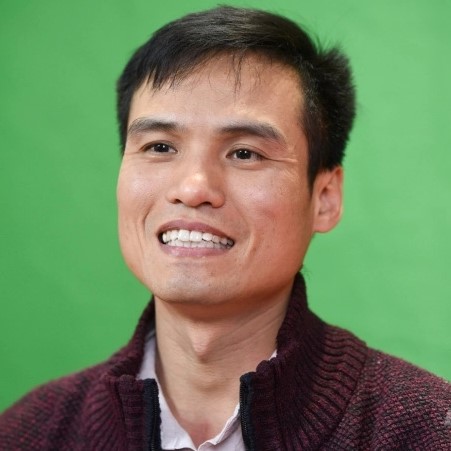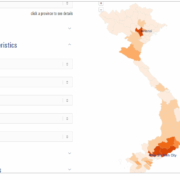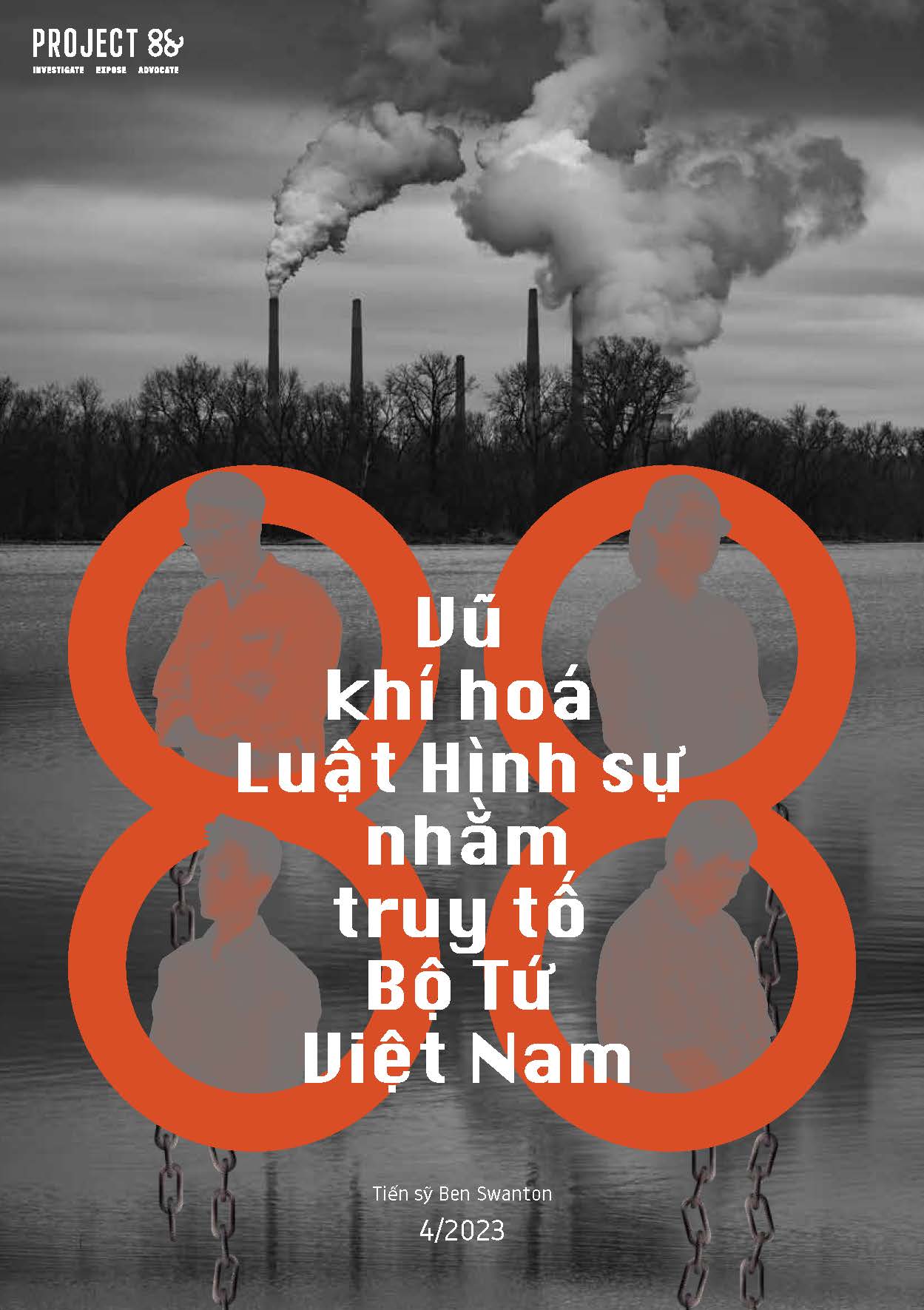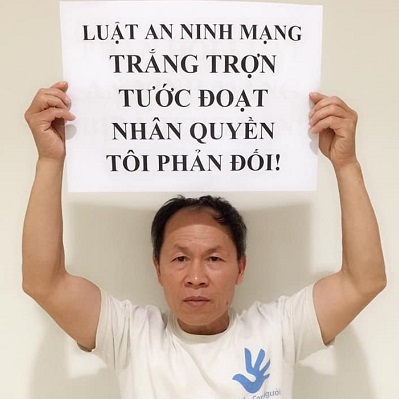Project88 Submission to the U.S. Department of State: 2023 US-Vietnam Human Rights Dialogue
Project88 made the below submission ahead US-Vietnam Human Rights Dialogue. Click here to download the full pdf.
***
October 31, 2023
United States Department of State
Washington D.C.
Re: 2023 US-Vietnam Human Rights Dialogue
Dear Secretary Blinken,
The achievement of closer ties between the U.S. and Vietnam has coincided with a significant increase in human rights abuses by the Vietnamese state against its own citizens. Far from promoting greater respect of human rights, as the relationship between the two countries has strengthened over the past decade, the human rights situation has deteriorated. This deterioration is apparent across several indicators.
Death penalty
Vietnam kills more of its own citizens than almost any other country. Between 2013 and 2016, the most recent time period for which data is available, the government went on a killing spree, executing 429 people.[1] This puts Vietnam behind only China and Iran in its use of the death penalty. Globally, use of the death penalty is at an all-time low. At the end of 2022, 112 countries had abolished the death penalty for all crimes.[2] In spite of this trend, last year Vietnam handed down 102 death sentences.[3]
Political prisoners
According to Project88’s database, Vietnam now has close to 200 political prisoners.[4] This figure, however, masks the number of people who have been persecuted into silence or forced into exile.
The current efforts by the State Department to improve the situation do not appear to be effective in ending this systematic persecution. The U.S. has been instrumental in efforts to release political prisoners from prison—Nguy Thi Khanh and Mai Phan Loi were both released ahead of President Joe Biden’s visit to the country. However, these efforts, while tremendously important, have not changed the reality of the situation for human rights activists in Vietnam.
Vietnamese authorities use political prisoners as bargaining chips. After one prisoner is released following diplomatic negotiations, the government arrests another activist. Immediately after President Biden’s visit to the country, Hoang Thi Minh Hong, an environmental activist and Obama Scholar, was sentenced to three years’ imprisonment on the same spurious tax evasion charge that Khanh and Loi were charged with. In addition, Ngo Thi To Nhien, the director of a Vietnamese energy policy think-tank, was arrested on a charge that was politically motivated just five days after President Biden announced the elevation of diplomatic relations with Vietnam to the level of a strategic partnership.
There is no indication that Vietnam will stop arresting environmental activists in spite of the efforts by the State Department. Instead of focusing solely on the release of individual political prisoners, State Department officials should make more ambitious demands of the Vietnamese government, such as a guarantee of no further arrests of human rights activists, that are likely to result in concrete progress.
Crackdown on activism, dissent, and civil society
Vietnam has an abysmal record on human rights, and the government’s crackdown on activism and dissent has continued to intensify in recent years. Scores of dissenters and human rights activists have been imprisoned on vaguely worded national security or defamation charges.
Vietnam has subjected human rights activists to harassment and abuse. State actors have arbitrarily detained, physically attacked, and imposed travel bans on human rights activists, while surveilling and intimidating their family members.[5] On 8 January 2021, UN experts voiced concerns over Vietnam’s use of ‘vaguely defined laws’ to arbitrarily detain HRDs [human rights defenders] as part of an ‘increasing clampdown’ on freedom of expression in the country.[6]
In the past two years, there has been a shift in who the Vietnamese government has targeted for arrest. Previously, Vietnam exclusively targeted human rights and democracy activists. State authorities also imprisoned, or forced into exile, political dissidents, and bloggers. In recent years, however, the government has begun targeting directors of non-governmental development organizations and energy policy activists, many of whom worked on issues that are official government policy priorities.[7]
Leaders of NGOs have been arrested by, or faced persecution from, Vietnamese authorities. On December 16, 2022 Hoang Ngoc Giao, head of the Institute for Research on Policy, Law and Development, was arrested for allegedly committing tax evasion after he made numerous comments critical of the government concerning land rights.[8] In July 2023, Nguyen Son Lo, the former director of the Southeast and North Asia Institute of Research and Development, was sentenced to five years’ imprisonment under articles 331 and 356 of the criminal code.[9] Lo was a voice against governmental corruption in Vietnam. Similarly, Nguyen Thi Kieu Vien, the founder and executive director of Towards Transparency, the only anticorruption NGO then-operating in Vietnam, was forced into exile.[10]
In a disturbing twist, the government has now started targeting human rights lawyers who represent activists when they face criminal prosecution. Starting in late 2022, the Vietnamese government harassed and interrogated a group of human rights lawyers after they provided legal counsel for members of an independent Buddhist monastery. Three of the lawyers were forced into exile after police issued warrants for their arrest.[11]
Imprisonment of environmental activists on false criminal charges
As the State Department noted in its 2022 Vietnam Country Report on Human Rights Practices, Vietnam convicted four environmental activists for tax evasion.[12] This trend has continued in 2023. Over the past two years, Vietnam has arrested or imprisoned six key leaders of the country’s climate change movement. Nguy Thi Khanh, Dang Dinh Bach, Mai Phan Loi, Bach Hung Duong, and Hoang Thi Minh Hong were all imprisoned on spurious tax evasion charges since 2021.[13] In addition, Vietnam arrested Ngo Thi To Nhien, the head of an energy policy think-tank, in September 2023 for allegedly misappropriating government documents.
An investigation by Project88 published in April documents clear evidence that the prosecutions of the environmental activists were politically driven and designed to criminalize policy activism.[14] The activists’ efforts to organize non-profits into powerful advocacy coalitions and promote a civil society movement, brought them into conflict with the Communist Party of Vietnam. The common thread in these cases is that all of the individuals involved ran organizations that conducted advocacy on energy policy, and all received foreign funding to carry out this work.
These prosecutions are particularly relevant to U.S. foreign policy. On December 14, 2022, the Vietnamese government formed a Just Energy Transition Partnership (JETP) with the U.S. and several other governments to fund Vietnam’s transition towards renewable energy. USAID also provides funding for a number of energy projects outside of the JETP’s scope.
As part of the JETP, Vietnam is required to regularly consult with civil society. Vietnam cannot ensure a ‘just’ energy transition without allowing the participation of environmental activists and other members of Vietnamese civil society, particularly those who are critical of current governmental policies.[15] A robust civil society is necessary to hold the government to account to ensure that any energy transition is protecting the environment, the rights of workers, and members of marginalized communities.
However, despite overtures made by the Vietnamese government regarding the importance of transparency and participation, state authorities have continued to restrict the civic space with regards to environmental activism. The government has made it very difficult for any environmental organization to function in the country, particularly if the organization attempts to conduct policy research or advocacy on energy and climate change.
Restrictions on foreign development aid
Vietnam has also taken measures to restrict the ability of NGOs to operate in the country or receive foreign funding. As the State Department noted in its 2022 Vietnam Country Report on Human Rights Practices, Vietnam’s ‘legal and regulatory framework includes mechanisms particularly aimed at restricting the freedom of NGOs.’[16] This framework is still in place, and Vietnamese authorities have taken additional action to crackdown on the ability of NGOs to receive foreign development aid.
For instance, Decree 80/2020/ND-CP, enacted July 8, 2020, and Decree 56/2020/ND-CP, enacted May 25, 2020, regulate the activities and funding of NGOs operating in Vietnam. The decrees impose onerous requirements on the registration of NGOs and the funding of projects, while increasing the power of the Ministry of Public Security in approving development projects. In addition, Decision 06/2020/QD-Ttg, announced February 21, 2020, requires that organizations receive approval from a number of government agencies, as well as the Prime Minister, to host any conference or seminar that relates to national sovereignty, security, human rights, ethnicity, or religion. These decrees and decisions have significantly weakened the ability of Vietnamese NGOs to operate independently or receive the funding necessary to participate in the sustainable development of Vietnam.[17]
The Vietnamese government has also made numerous statements in recent months expressing concern that foreign donors are funding civil society to interfere in Vietnam’s internal affairs on certain issues, including the country’s energy transition.[18]
On September 15, 2023, the same day that Ngo Thi To Nhien was detained, Nhan Dan, the official newspaper and mouthpiece of the Communist Party of Vietnam, took aim at foreign donors who are funding civil society organizations in Vietnam.[19] The editorial claimed that a subset of the 388 foreign NGOs operating in the country are using international cooperation on certain issues as a cover to interfere in Vietnam’s internal affairs:
‘Some foreign non-governmental organizations take advantage of sponsorship activities to entice non-governmental organizations operating in the field of science and technology[20] to participate in projects that risk violating the country’s security, social order, and safety. By commissioning research, they direct individuals and organizations operating in the field of science and technology to conduct research and publish a series of reports and surveys containing one-sided, negative content, tarnishing the situation of the country and people of Vietnam.’[21]
This editorial, which expresses the official view of the communist party, has come amid a deepening crackdown upon civil society and efforts to restrict foreign aid.
In 2016, the party leadership passed Resolution 04-NQ/TW, a policy of party supremacy that expresses hostility to the very concept of civil society.[22] Resolution 4 states that party members advocating for a stronger civil society ‘undermines the leadership role of the party’.[23] A guidance note on the implementation of the resolution warns that the ‘enemy and reactionary forces have stepped up activities against us’, singling out ‘the US and other Western countries [that] are using aid to shape [Vietnam’s] law and policy’, while ‘providing aid to domestic “non-governmental” organizations to promote a Western model of “civil society”’.[24]
Vietnam’s rhetoric against the foreign funding of NGOs has moved beyond mere words. Each of the six environmental activists that were arrested have received funding from foreign sources. In addition to the arrests, each of the environmental organizations that the activists ran were forced to shut down. This pattern has made other NGOs reluctant to weigh in on matters of public policy for fear of closure. According to an NGO administrator interviewed by Project88, the government has never been transparent about the tax status of local NGOs and, in recent years, has used this ambiguity against them.[25] Due to fear of reprisal, Vietnamese civil society has also become less willing to participate with the UN. In the fourth cycle of the Universal Periodic Review of Vietnam, for instance, very few civil society organizations have engaged with the Human Rights Council for fear of arrest.[26]
Recommendations
The U.S.-Vietnam Comprehensive Strategic Partnership aims to ‘advance human rights and fundamental freedoms.’[27] If the U.S. is serious about the goals set forth in the strategic partnership, the U.S.-Vietnam Human Rights Dialogue must not become a substitute for concrete progress on human rights, but instead address the following issues:
Death penalty
- Urge Vietnam to abolish the death penalty and issue a moratorium on all impending executions.
Political prisoners
- Demand Vietnam to immediately and unconditionally release all political prisoners. It is essential that the U.S. continue to pressure the Vietnamese government to unconditionally release all political prisoners who are currently imprisoned.
Crackdown on civil society
- Ensure that a moratorium on the arrests of human rights activists is enacted. Advocating for the release of one political prisoner only for Vietnam to continue to arrest other activists is not a sustainable strategy.
- Urge Vietnam to stop criminalizing dissent.
Environmental activists and Vietnam’s energy transition
- Secure a guarantee of no more arrests of climate activists.
- Urge Vietnam to ensure that the country’s civil society is able to effectively participate in Vietnam’s energy transition.
Restrictions on foreign aid
- Ensure that Vietnam stops taxing foreign aid and ensure that Vietnamese civil society has access to the funds necessary to fulfill its essential role in advocating for policy change and holding the government to account.
- Indicate to the Vietnamese government that a continuation of the practice of taxing foreign aid money may affect U.S. development assistance to the country.
- Urge Vietnam to guarantee the tax-exempt status of all local organizations receiving foreign aid for non-profit development activities.
- Demand that Vietnam repeal restrictions on foreign aid that limit the ability of civil society to freely associate.
Sincerely,
Project 88
© 2023 The 88 Project
[1] Mike Ives (2017, Aug. 12). ‘It’s very easy to die there’: How prisoners fare in Vietnam. New York Times. https://www.nytimes.com/2017/08/12/world/asia/vietnam-prison-abuses.html
[2] Amnesty International (2023, May 16). Death sentences and executions, 2022. https://www.amnesty.org/en/documents/act50/6548/2023/en/
[3] Ibid.
[4] Database of persecuted activists in Vietnam. (2023, August 12). Project 88. https://the88project.org/database/
[5] Frontline Defenders & Project88 (2023, Oct. 10). Vietnam UPR Submission. https://www.frontlinedefenders.org/sites/default/files/vietnam_upr_submission_-_fld_the_88_project.pdf
[6] OHCHR, Press briefing notes on Viet Nam, https://www.ohchr.org/en/2021/01/press-briefing-notes-viet-nam? LangID=E&NewsID=26644
[7] Frontline Defenders & Project88 (2023, Oct. 10). Vietnam UPR Submission. https://www.frontlinedefenders.org/sites/default/files/vietnam_upr_submission_-_fld_the_88_project.pdf
[8] Project88. Hoang Ngoc Giao. https://the88project.org/profile/602/hoang-ngoc-giao/
[9] Project88. Nguyen Son Lo. https://the88project.org/profile/591/nguyen-son-lo/
[10] Sustainable Vietnam (Jan. 10, 2020). Meet Sustainable Vietnam contributor: Nguyen Thi Kieu Vien. https://sustainablevietnam.com/2020/01/10/meet-sustainable-vietnam-contributor-nguyen-thi-kieu-vien/
[11] Database of Persecuted Activists in Vietnam, Retrieved Oct. 10, 2023, https://the88project.org/database/
[12] US State Dept. Bureau of Democracy, Human Rights, and Labor. (2022). 2022 Country Reports on Human Rights Practices: Vietnam. https://www.state.gov/reports/2022-country-reports-on-human-rights-practices/vietnam/
[13] Swanton, Ben (2023). Weaponizing the law to prosecute the Vietnam Four. Project88. https://the88project.org/wp-content/uploads/2023/04/Weaponizing-the-law-report-Project-88-ENG.pdf
[14] Ibid.
[15] Robertson, Phil (2023, Sept. 9). Biden Should Press Climate Activist Rights in Vietnam. Asia Times. Retrieved Oct. 20, 2023, from https://asiatimes.com/2023/09/biden-should-press-climate-activist-rights-in-vietnam/
[16] US State Dept. Bureau of Democracy, Human Rights, and Labor. (2022). 2022 Country Reports on Human Rights Practices: Vietnam. https://www.state.gov/reports/2022-country-reports-on-human-rights-practices/vietnam/
[17] Special Rapporteur on the rights to freedom of peaceful assembly and of association and the Special Rapporteur on the right to freedom of opinion and expression (2021, Dec. 10). Ref: OL VNM 7/2021. https://spcommreports.ohchr.org/TMResultsBase/DownLoadPublicCommunicationFile?gId=26885
[18] Swanton, Ben (2023). Weaponizing the law to prosecute the Vietnam Four. Project88. https://the88project.org/wp-content/uploads/2023/04/Weaponizing-the-law-report-Project-88-ENG.pdf
[19] Quang Minh (2023, September 15). Không được phép can thiệp, xâm phạm quyền, lợi ích hợp pháp của đất nước và nhân dân Việt Nam. Báo Nhân Dân điện tử. Retrieved Oct. 4, 2023, from https://nhandan.vn/khong-duoc-phep-can-thiep-xam-pham-quyen-loi-ich-hop-phap-cua-dat-nuoc-va-nhan-dan-viet-nam-post772574.html
[20] Vietnamese law does not recognize local non-governmental organizations. Most NGOs are registered as science and technology associations.
Swanton, Ben (2023). Weaponizing the law to prosecute the Vietnam Four. Project88. https://the88project.org/wp-content/uploads/2023/04/Weaponizing-the-law-report-Project-88-ENG.pdf, p.15.
[21] Quang Minh (2023, September 15). Không được phép can thiệp, xâm phạm quyền, lợi ích hợp pháp của đất nước và nhân dân Việt Nam. Báo Nhân Dân điện tử. Retrieved Oct. 4, 2023, from https://nhandan.vn/khong-duoc-phep-can-thiep-xam-pham-quyen-loi-ich-hop-phap-cua-dat-nuoc-va-nhan-dan-viet-nam-post772574.html
[22] Swanton, Ben (2023). Weaponizing the law to prosecute the Vietnam Four. Project88. https://the88project.org/wp-content/uploads/2023/04/Weaponizing-the-law-report-Project-88-ENG.pdf
[23] Ibid.
[24] Ibid.
[25] Ibid.
[26] Radio Free Asia (2023, Sept. 22). Vietnamese NGOs shy from UN engagement fearing government reprisal. https://www.rfa.org/english/news/vietnam/ngos-09222023111250.html
[27] The White House (2023, Sept. 10). FACT SHEET. https://www.whitehouse.gov/briefing-room/statements-releases/2023/09/10/fact-sheet-president-joseph-r-biden-and-general-secretary-nguyen-phu-trong-announce-the-u-s-vietnam-comprehensive-strategic-partnership/








